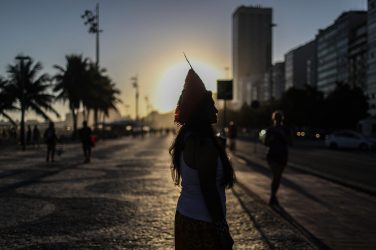Disney-Marvel’s “Black Panther” movie, which has gained traction for its empowering notes on Black power, ruled the box office for the second weekend collecting a whopping US$108 million at over 4,000 U.S. locations, but the movie’s reach and power is uplifting Black and Brown communities worldwide.
In Brazil, the organizers of the Black collective, “Coletivo Preto” along with the Grupo Emu, which “investigates black aesthetics as a theatrical language, conciliating a dialogue of the racial question with contemporaneity” marked their protest against the deeply entrenched segregation plaguing the nation which has a rich Black history.
On February 19, activists planned a “Rolezinho,” a form of protest by the Afro-Brazilian communities which roughly translates to “Black Stroll”, in a mall in the white Brazilian neighborhood, Leblon, which is surrounded by favelas, or slums, like Vidigal, Rocinha, Cruzada, and Cantagalo.
Lucinio Januar, an Afro-Brazilian actor, told the Intercept, “When we come here we almost never see any of our people in this kind of place. It’s as though the place was only meant for white people.
“So when we have a film written by a Black man, with Black actors and Black producers, we felt it is our duty to occupy this space, so we could serve as an example.”
“It makes me want to win, it makes me want to fight, it makes me like myself more, like my skin tone, like my kind of my hair, like the shape of my nose … Because you start to see people who are like you … empowered, happy with themselves, and you start to like yourself more.
“And you see there’s nothing wrong with you. That really Black is beautiful, Black is capable, Black is incredible, and Blackness needs to be respected,” one of the Afro-Brazilian actors told the Intercept.
Such Black-led protests have been prevented in the past. The Intercept quoted an unidentified person during a 2014 interview by EFE Brasil, after an impeded ‘Rolezinho’ outside of Shopping Mall, Leblon.
“I think that the rolezinhos reveal how racist the Brazilian society and elite actually are. They reveal a fear that is unjustifiable. They reveal that as long as Brazilian racism is able to ‘keep everyone in their places’ there is no problem. The problem is, since the ’90s, thanks to the efforts of the Black movement, Blacks have begun to enter into spaces that they hadn’t previously occupied.”
According to a survey by the National Cinema Agency, Ancine, Black people constitute only 7 percent of professionals in the film industry in Brazil, a country with extremely rich African heritage.
In Nigeria, Africa’s largest economy and biggest film industry, people in large numbers went to watch the movie sporting ethnic gear.
“Black Panther is a film that celebrates black excellence. Bringing it to Nigeria is especially exciting,” Bolaji Kekere-Ekun, a 33-year-old filmmaker, told Reuters.
teleSUR






